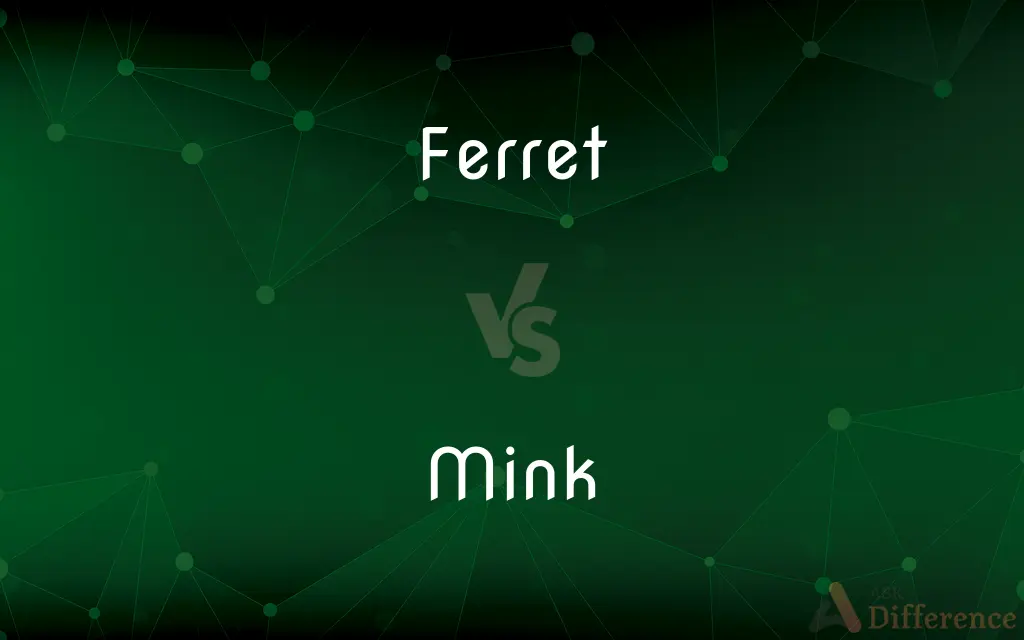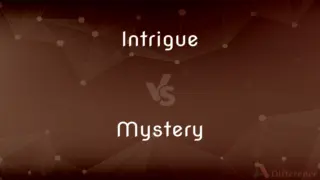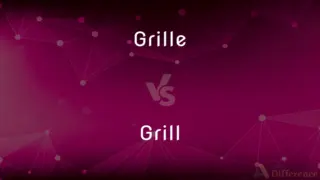Ferret vs. Mink — What's the Difference?
By Tayyaba Rehman — Updated on September 5, 2023
Ferrets are domesticated animals often kept as pets, while minks are semi-aquatic wild mammals known for their fur.

Difference Between Ferret and Mink
Table of Contents
ADVERTISEMENT
Key Differences
Ferrets are domesticated members of the Mustelidae family, often kept as pets and sometimes used for hunting pests. Minks, on the other hand, are wild members of the same family, known primarily for their glossy fur, which is often used in the fashion industry.
Ferrets are sociable creatures and adapt well to human interaction, which makes them popular as household pets. Minks, being wild animals, are more aggressive and are not considered suitable as pets.
Ferrets have a slender body shape and come in various colors and patterns. Minks have a similar slender build but usually have a rich dark brown fur, known for its luxurious quality.
The natural habitat for ferrets, before domestication, was mainly grasslands. Minks prefer watery habitats such as riverbanks and lakesides, aligning with their semi-aquatic nature.
Both animals have sharp teeth and are carnivorous. However, a mink's diet in the wild primarily consists of aquatic animals like fish and crustaceans, while ferrets, especially domestic ones, eat prepared feeds and some meats.
ADVERTISEMENT
Comparison Chart
Domestication
Domesticated and kept as pets
Wild animals, not typically kept as pets
Usage
Pets and pest control
Fur for the fashion industry
Color Variations
Various colors and patterns
Primarily dark brown
Habitat
Adapted to human households; originally grasslands
Semi-aquatic, preferring riverbanks and lakesides
Diet
Prepared feeds and meats
Aquatic animals such as fish and crustaceans
Compare with Definitions
Ferret
A domesticated carnivorous mammal often kept as a pet.
She has a playful ferret named Oscar.
Mink
A semi-aquatic carnivorous mammal known for its luxurious fur.
The fashion industry values mink fur for its quality.
Ferret
A small animal used for hunting rabbits and rats.
Farmers used ferrets to control the rat population.
Mink
A wild animal primarily found near water bodies.
Minks are common near the riverbanks in this region.
Ferret
A member of the Mustelidae family, related to weasels.
Ferrets, like weasels, have slender bodies.
Mink
A member of the Mustelidae family with glossy dark brown fur.
A mink's coat is especially thick during winter.
Ferret
An animal with a curious nature and a penchant for digging.
The ferret burrowed into the pile of clothes.
Mink
An animal hunted for its pelt used in clothing.
The use of mink fur in clothing has become controversial.
Ferret
A creature known for its playful antics and sociable behavior.
My ferret loves to play with toys.
Mink
A creature with an aggressive nature when compared to its domesticated relatives.
Approaching a wild mink can be dangerous.
Ferret
The ferret (Mustela furo) is a domestic species of small mustelid. The only domesticated species in Mustelidae, it is thought to be a descendant of the European polecat, a mammal belonging to the same genus as the weasel, Mustela.
Mink
Mink are dark-colored, semiaquatic, carnivorous mammals of the genera Neogale and Mustela and part of the family Mustelidae, which also includes weasels, otters, and ferrets. There are two extant species referred to as "mink": the American mink and the European mink.
Ferret
A domesticated mustelid mammal (Mustela furo syn. Mustela putorius subsp. furo) with an elongated flexible body, often kept as a pet and sometimes trained to hunt rats or rabbits.
Mink
Either of two semiaquatic mustelid carnivores, Mustela lutreola of Europe or Neovison vison of North America, having a pointed snout, short legs, and partly webbed toes. The North American species is bred for its commercially valuable fur.
Ferret
A black-footed ferret.
Mink
The soft thick lustrous fur of a mink.
Ferret
A narrow piece of tape used to bind or edge fabric.
Mink
A coat, stole, or hat made of this fur.
Ferret
To hunt (rabbits, for example) with ferrets.
Mink
(plural mink or minks) Any of various semi-aquatic, carnivorous mammals in the Mustelinae subfamily, similar to weasels, with dark fur, native to Europe and America, of which two species in different genera are extant: the American mink (Neovison vison) and the European mink (Mustela lutreola).
Ferret
To drive out, as from a hiding place; expel.
Mink
(plural mink) The fur or pelt of a mink, used to make apparel.
Ferret
To uncover and bring to light by searching. Often used with out
"Their work merely points the way for others to ferret out the core components of all proteins" (Natalie Angier).
Mink
(plural minks) An article of clothing made of mink.
Ferret
To hound or harry persistently; worry.
Mink
(plural minks) An individual with poor personal hygiene; a smelly person.
Ferret
To engage in hunting with ferrets.
Mink
A carnivorous mammal of the genus Mustela (foremrly Putorius), allied to the weasel. The European mink is Mustela lutreola. The common American mink (Mustela vison) varies from yellowish brown to black. Its fur is highly valued. Called also minx, nurik, and vison.
Ferret
To search intensively.
Mink
The fur of the mink{1}. Together with sable, it is one of the most expensive furs not taken from endangerd species. When the fur is taken from animals grown on a farm, it called ranch mink.
Ferret
An often domesticated mammal (Mustela putorius furo) rather like a weasel, descended from the polecat and often trained to hunt burrowing animals.
Mink
The expensive fur of a mink
Ferret
The black-footed ferret, Mustela nigripes.
Mink
Fur coat made from the soft lustrous fur of minks
Ferret
(figurative) A diligent searcher.
Mink
Slender-bodied semiaquatic mammal having partially webbed feet; valued for its fur
Ferret
(dated) A tape of silk, cotton, or ribbon, used to tie documents, clothing, etc. or along the edge of fabric.
Ferret
To hunt game with ferrets.
Ferret
To uncover and bring to light by searching; usually to ferret out.
Ferret
An animal of the Weasel family (Mustela furo syn. Putorius furo), about fourteen inches in length, of a pale yellow or white color, with red eyes. It is a native of Africa, but has been domesticated in Europe. Ferrets are used to drive rabbits and rats out of their holes. They are sometimes kept as pets.
Ferret
A kind of narrow tape, usually made of woolen; sometimes of cotton or silk; - called also ferreting.
Ferret
The iron used for trying the melted glass to see if is fit to work, and for shaping the rings at the mouths of bottles.
Ferret
To drive or hunt out of a lurking place, as a ferret does the cony; to search out by patient and sagacious efforts; - often used with out; as, to ferret out a secret.
Master Fer! I'll fer him, and firk him, and ferret him.
Ferret
Ferret of prairie regions of United States; nearly extinct
Ferret
Domesticated albino variety of the European polecat bred for hunting rats and rabbits
Ferret
Hound or harry relentlessly
Ferret
Hunt with ferrets
Ferret
Search and discover through persistent investigation;
She ferreted out the truth
Common Curiosities
Are both ferrets and minks carnivores?
Yes, both are carnivorous, though their diets differ.
Which is larger, a ferret or a mink?
They are similar in size, but minks can sometimes be larger.
Are ferrets and minks the same?
No, ferrets are domesticated pets while minks are wild and known for their fur.
Can you keep a mink as a pet like a ferret?
Generally, no. Minks are wild and can be aggressive.
Which one is more popular in the fashion industry?
Minks are popular for their luxurious fur.
How long have humans domesticated ferrets?
For over 2000 years, mainly for hunting and later as pets.
Are ferrets and minks related?
Yes, both belong to the Mustelidae family.
Where can you commonly find minks in the wild?
Near water bodies like rivers and lakes.
Do ferrets and minks have similar lifespans?
Not necessarily; domesticated ferrets might live longer due to care.
Are there any legal restrictions on keeping minks?
In many places, yes, due to their wild nature.
How can you differentiate between a mink and a ferret at a glance?
Minks generally have darker, glossier fur.
Is it ethical to use mink fur for fashion?
This is debated, with many advocating against fur use.
Can ferrets swim like minks?
While they can swim, ferrets are not as adapted to water as minks.
What are common colors for ferrets?
They can vary, including sable, white, black, and albino.
Do minks have any natural predators?
Yes, including larger carnivores, birds of prey, and humans.
Share Your Discovery

Previous Comparison
Intrigue vs. Mystery
Next Comparison
Grille vs. GrillAuthor Spotlight
Written by
Tayyaba RehmanTayyaba Rehman is a distinguished writer, currently serving as a primary contributor to askdifference.com. As a researcher in semantics and etymology, Tayyaba's passion for the complexity of languages and their distinctions has found a perfect home on the platform. Tayyaba delves into the intricacies of language, distinguishing between commonly confused words and phrases, thereby providing clarity for readers worldwide.
















































